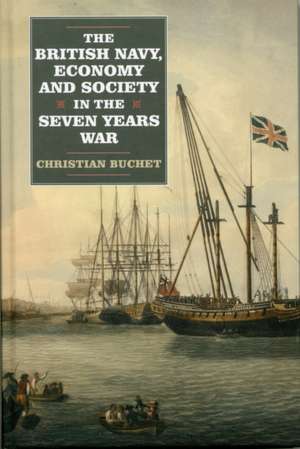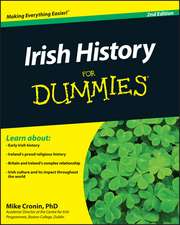The British Navy, Economy and Society in the Seven Years War
Autor Christian Bucheten Limba Engleză Hardback – 20 feb 2013
This book, by a leading French maritime historian, discusses how Britain's success in the Seven Years War (1756-63) was made possible by the creation of a superb victualling system for the British navy. It shows how this system had been developed over the preceding centuries, how it balanced carefully the advantages of state control with the flexibility of commercial contracting, and how the system was designed to mesh with and support British strategic ambitions. It provides rich detail on how the system worked, how it was administered, how key products were priced, bought, stored and transported, and how it compared, very favourably, to equivalent systems in France and elsewhere.
The book shows how the increasing efficiency of theVictualling Board enabled the navy to take advantage of agricultural, commercial and financial advances in the British economy to supply its front line fighting forces over ever longer distances and ever longer periods. The Victualling Board was one of a number of interfaces between the demands of the State and the supply facilities of the economy, to their mutual benefit. As a major purchaser through competitive tender, the Board made a positive contribution to the entrepreneurial spirit of British society. The book goes beyond maritime history by discussing how naval supply provided a huge stimulus for British finance, agriculture, trade and manufacturing, and argues that all this together was one of the principal causes of Britain's later Industrial Revolution.
CHRISTIAN BUCHET is Professor of Modern History and Director of the Centre d'Etudes de la Mer at the Institut Catholique de Paris. Besides comparative studies of the British and French navies 1688-1783, he has written extensively on maritime environmental issues and is Secretary General of the National Council of the French Archipelago
Preț: 727.94 lei
Preț vechi: 945.39 lei
-23% Nou
Puncte Express: 1092
Preț estimativ în valută:
139.31€ • 144.90$ • 115.01£
139.31€ • 144.90$ • 115.01£
Carte tipărită la comandă
Livrare economică 14-28 aprilie
Preluare comenzi: 021 569.72.76
Specificații
ISBN-13: 9781843838012
ISBN-10: 184383801X
Pagini: 316
Dimensiuni: 156 x 234 x 19 mm
Greutate: 0.68 kg
Editura: BOYDELL PRESS
ISBN-10: 184383801X
Pagini: 316
Dimensiuni: 156 x 234 x 19 mm
Greutate: 0.68 kg
Editura: BOYDELL PRESS
Notă biografică
Christian Buchet
Cuprins
Foreword Introduction From an Empirically-Based Organisation to a Centrally Planned System: The Strengths and Weaknesses of the Victualling Board The Victualling Board and the Seven Years War Food Rations and their Evolution The Victualling Board's Principal Bases An Example of a Victualling Yard under the Jurisdiction of the Victualling Board: Plymouth, Satellite of British Logistical Power Victualling in the Secondary Home Ports and in the Overseas Stations An Example of Stations Managed by a Private Contractor in the Service of the Crown: The Caribbean Staging Posts Meat Cereals and Pulses The Remaining Sectors: Beverages, Butter and Cheese, Salt, Olive Oil and Raisins Conclusion Appendix I: Ordinary Charge of the Victualling Board in 1747 Appendix II: Commissioners of the Victualling Board, 1755-1763 Appendix III: The Structure of British Naval Administration Appendix IV: Itemised Distribution of Victualling Board Expenses Appendix V: List of Victuals on the Southsea Castle Leaving for the East Indies at the end of 1759 with a Crew of 130 Men Appendix VI: Process to be used in the Curing of Meat Appendix VII: Wage Totals, according to Activity, Paid to Victualling Personnel in the London Yard in the First Quarter of 1761 Appendix VIII: Supervisory Staff of the Victualling Board 1761 Sources and Bibliography
Descriere
An analysis of how Britain developed a superb supply system for the navy, with beneficial consequences both for victory in war and for Britain's economic development.










